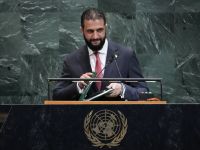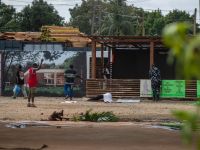Lebanon's new parliament, which convenes Tuesday, will once again reflect Syria's dominance over its neighbor as MPs re-elect as speaker Nabih Berri, firmly allied with Damascus.
Prime Minister Salim Hoss, whose government was formed in December 1998, must resign as soon as the new parliament convenes, but President Emile Lahoud asked him on Monday to take care of remaining business.
The biggest winner in parliamentary elections August 27 and September 3 was Hoss's predecessor Rafiq Hariri, who in his six years as prime minister had at times a shaky relationship with Syria, although he knew how to play by Damascus' rules.
Syria has accepted Hariri's return to power and ordered Lahoud to "normalize relations" with him, an MP allied with Hariri said.
"Hariri barely escaped a Lahoud-led campaign that sent to prison several of his colleagues. Today, he is coming back in force after an unpleasant time in the wilderness," said the deputy, who requested anonymity.
Lahoud, the former head of the army, has been criticized for his tactlessness in domestic politics and for surrounding himself with military types, turning off almost all of Lebanon's political elite.
In the past two weeks Lahoud has met with Hariri twice in an effort to break the ice between two men whose views are at odds, those close to them said.
Lahoud, a Maronite Christian chosen by Syria in November 1998, is now required to hold binding negotiations with the 128-member parliament to select the prime minister and ministers.
Hariri, a Sunni Muslim business tycoon, swept Beirut during the recent elections, winning 18 out of 19 seats. Those loyal to him will hold a total of 23 seats in the new parliament, which is evenly divided between Christians and Muslims.
The bloc of Hariri's ally Walid Jumblatt, the religious leader of Lebanon's Druze community and a critic of Syria's heavy hand, will hold 16 seats.
The total of 39 seats does not give Hariri a majority, but gives him greater standing than any of his potential allies, including Hoss.
But Berri, a Shiite Muslim who is a strong supporter of Syria, will likely be re-elected speaker. Damascus believes it can count on complete control over about 80 MPs, said a Lebanese political figure close to the Syrians.
This parliamentary majority includes two Shiite groups, Berri's 17-deputy Amal and the fundamentalist movement Hezbollah, which will hold 12 seats. Also reliably pro-Syrian are Lahoud's 10-deputy bloc and 10 MPs allied with outgoing ministers Soleiman Frangieh and Nagib Miqati, both close to Syrian President Bashar al-Assad.
The other 20 pro-Syrian deputies come from a variety of small parties, both Christian and Muslim.
The parliament's term has been extended eight months, until May 2005, which will give Damascus added leverage during the October 2004 presidential election.
"Syria's influence, slightly broken by recent calls, especially in Christian circles, for the retreat from Lebanon of its 35,000 soldiers, will be preserved through the majority it holds in parliament," the pro-Syrian politician said.
Of the new parliament's nine independents, all of whom are Christian, only one -- the 80-plus-year-old Albert Mukhaiber -- is a virulent critic of "Syrian interference" in Lebanon. The others call solely for "correcting" the balance in Lebanese-Syrian relations.
Syria, which has stationed troops in Lebanon since the 1970s, became the predominant influence in its smaller neighbor in 1990 as Lebanon ended its 15-year sectarian civil war -- BEIRUT (AFP)
© 2000 Al Bawaba (www.albawaba.com)







